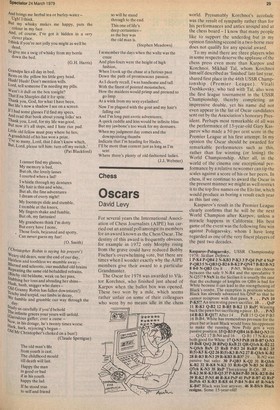Chess
Oscars
David Levy
For several years the International Association of Chess Journalists (AIPE) has carried out an annual poll amongst its members for an award known as the Chess Oscar. The destiny of this award is frequently obvious, for example in 1972 only Morphy rising from the grave could have reduced Bobby Fischer's overwhelming vote, but there are times when I wonder exactly why the AWE members give their award to a particular Grandmaster.
The Oscar for 1978 was awarded to Viktor Korchnoi, who finished just ahead of Karpov when the ballot box was opened. These two won by a mile, which seems rather unfair on some of their colleagues who were by no means idle in the chess world. Presumably Korchnoi's accolade was the result of sympathy rather than for his performances and antics around and at the chess board — I know that many people like to support the underdog but in my opinion finishing second in a two-horse race does not qualify for any special award.
To my mind there are three players who in some respects deserve the applause of the chess press even more than Karpov and Korchnoi. Mikhail Tal, whom Korchnoi himself described as 'finished' late last year, shared first place in the 46th USSR Champion ship (Premier League). Vitali Tseshkovsky, who tied with Tal, also won the first league tournament in the USSR Championship, thereby completing an impressive double, yet his name did not even appear in the list of Oscar candidates sent out by the Association's honorary Pres ident. Perhaps most remarkable of all was the performance of 15-year-old Gary Kasparov who made a 50 per cent score in the Premier League at his first attempt. In my opinion the Oscar should be awarded for remarkable performances such as this, rather than for winning (or losing) the World Championship. After all, in the world of the cinema one exceptional performance by a relative newcomer can tip the scales against a score of his or her peers. In chess, if we continue to award the Oscar in the present manner we might as well restrict it to the top five names on the Elo list, which would produce as boring a result each year as this last one.
Kasparov's result in the Premier League clearly confirms that he will be the next World Champion after Karpov. unless a miracle happens in California. His best game of the event was the following fine win against Polugaevsky, whom I have long regarded as one of the very finest players of the past two decades.
Kasparov-Polugaevsky, USSR Championship 1978: Sicilian Defence.
1 P-K4 P-QB4 2 N-KB3 P-K3 3 P-Q4 PxP 4 NxP P-QR3 5 N-QB3 Q-B2 6 B-K2 P-QN4 7 B-B3 B-N2 8 0-0 N-QB3 On 8 . . . P-N5, White can choose between the safe 9 N-R4 and the speculative 9 N-OS!? 9 NxN In the Sicilian it is usually the case that the exchange of knights on 0B6 is bad for White because it can lead to the strengthening of Black's centre. The exception is positions where Black has already advanced his QNP so that he cannot recapture with that pawn. 9 . . . PxN 10 P-K5!? An intere sting pawn sacrifice. 10. . . QxP 11 R-K1 Q-B2 12 B-R5 B-K2 13 RxP! Winning back the pawn but sacrificing a piece. 13. . . P-N3 14 R-K1 R-Q1?! After 14 . . . PxB 150-04 P-B3 16 B-B4, White has tremendous pressure for the piece but at least Black would force his opponent to make the running. Now Polu gets a very passive position. 15 Q-B3 P-QB4 16 B-B4Q-N316
.0-02 17B-N4 and 16 . . 0-B1 17 N-K4 are both good for White. 17 Q-N3 PxB 18 B-B7 Q-N3 19 BxR QxQ 20 RPxQ KAB 21 QR-Qlch K-B2 22 N-Q5ch BxN 23 RxB P-R3 24 RxRP R-R2 25 R(5)-K5 K-Q2 26 R(5)-K3 R-N2 27 R-Q3ch K-B2 28 R-R3 R-N3 29 R-KB3 B-B3? 29 . . . R-N2 was passive but safer. 30 P-QB3 K-Q2 31 R-Q3ch K-B2 32 R-K8 N-K2 33 R(8)-Q8 N-B3 34 R(8)Q7ch K-N3 35 RxP Threatening R-06. 35 . . . B-K2 36 R-K3 B-Q3 37 P-KB4 P-115 38 K-R2 B-B4 39 R-K2 P-N5 40 R-K4 PxP 41 PxP B-B7 42 RxP BxPch 43 K-R3 B-K8 44 P-R4 N-R4 45 R-N4ch K-B4? Black was lost anyway. 46 R-B5ch Black resigns. Some 15-year-old!


































 Previous page
Previous page